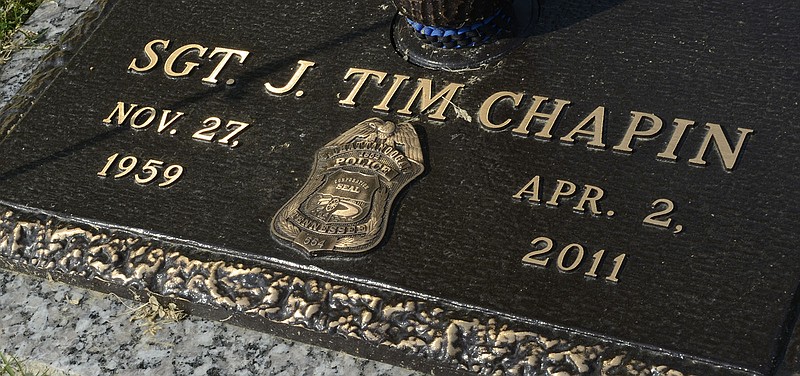At the end of a daylong golf tournament, Chattanooga police Sgts. Tim Chapin and Gregg Bowman were packing up to go home when Bowman noticed his friend seemed a little off.
He asked Chapin if something was wrong, and the 26-year veteran of the force answered honestly.
"I just really don't want to go to work tomorrow," Chapin said. I know what you mean, Bowman commiserated, as co-workers do. In a hurry to get home, Bowman didn't press Chapin for details, even though it seemed like he wanted to talk.
The next day, on April 2, 2011, Chapin was shot and killed while responding to a pawnshop robbery on Brainerd Road.
Five years later, Bowman still wishes he'd stayed and talked to Chapin at the golf course that night.
"It kind of haunts me," he said.
The armed robbery call went out at 10:24 a.m. on April 2 at the U.S. Money Shops on Brainerd Road.
Officers Lorin Johnston and David Ashley were the first two on scene. As they arrived, 25-year-old escaped felon Jesse Mathews opened fire from inside the pawnshop.
Johnston pulled his car between Mathews and the man's getaway vehicle - where investigators would later find a stowed AR-15 rifle - and returned fire.
But Mathews, who was wearing a bulletproof vest, didn't go down. He just kept firing.
As the gun battle raged, Johnston moved to retrieve his assault rifle from the trunk of his patrol car and was shot in the back. His bulletproof vest stopped the round and he wouldn't realize he'd been hit until minutes later, when it was all over and he felt pain in his back.
Mathews fled out one of the pawnshop's side doors toward Old Birds Mill Road, and that's where Chapin found him and ran his patrol car into Mathews.
The man rolled up the hood and tumbled off. Mathews dropped a gun and a magazine.
Chapin got out and fired his Taser, but Mathews didn't stop. The robber unzipped his jacket and pulled out a second gun. Chapin pulled his own weapon and they both fired. Chapin emptied his gun and was reaching to reload when he was hit.
The bullet struck Chapin in the head, entering through the bridge of his nose, and he died almost instantly.
That day was just windy and cool enough that you needed to put on a coat.
By the time now-retired Assistant Chief Tim Carroll reached the robbery site, Mathews was already in an ambulance. Beyond that, past a patrol car, a small group of officers stood around a man in uniform on the ground.
Carroll couldn't tell who it was at first. He'd heard Tim, his former brother-in-law, was down, but he didn't - couldn't - believe it.
An officer leaned over the man on the ground, talking to the man and rubbing his back.
He's alive, Carroll thought. We're just waiting for a second ambulance.
Then he got closer, and he saw the blood, and he knew.
Tim was gone.
They were all reeling.
But slowly, Carroll remembered they were at a crime scene. He pushed the officers back, stopped them from walking through the shell casings. They strung up crime scene tape and started the long, slow investigation into the sprawling scene, an investigation that eventually delivered a conviction.
The plastic evidence markers kept blowing away in the wind.
On road trips to golf tournaments, Chapin would sometimes crank up country music just to annoy Bowman, who hated the genre.
Golf kept Bowman, Chapin and Capt. Brian Cotter together for years. The friends would try to outdress each other on the golf course, seeing who could wear the most outlandish outfit.
In one old photo, Chapin stands on the course in bright yellow trousers peppered with colorful polka dots. Cotter drapes one arm around Chapin's shoulder and holds a golf club in the other, wearing big, baggy red knickers.
Bowman eventually outdid them all when he started wearing a thick, pleated kilt.
The last time Cotter spoke to Chapin was on the golf course.
Chapin was walking away from the 14th green after a rough hole. Cotter yelled after him.
"Don't you give up on me, Chapin!"
His friend looked up, and smiled.
Chapin was fun, competitive and quiet, but not shy. He'd talk to anyone, and he rarely lost his temper, Cotter said. He was a man of faith and family. He held strong opinions on politics and was a calm, respectful, friendly police officer.
"But like anybody who is good at the job - and he was good at the job - he could be tough when he needed to be," Cotter said. "He wouldn't take any crap."
Work paled for Cotter after Chapin was gone. His days felt less interesting, less fun. There was less intensity.
Some things changed at the department, too.
Officers moved their rifles from the trunks of their patrol cars to secure racks mounted inside the vehicles, so the weapons were more readily accessible in a moment of crisis. And officers in training were encouraged to consciously think about whether a suspect was wearing body armor, and to aim for the head if their shots to the chest were ineffective.
For a long while after Chapin died, Cotter's first thought when he woke up each morning was his friend. He used to look for Chapin every time he went to the golf course, but that instinct has faded with time, some.
"It seems like a year ago," Cotter said. "It doesn't feel like it's been five years at all."
Contact staff writer Shelly Bradbury at 423-757-6525 or sbradbury@timesfreepress.com with tips or story ideas. Follow @ShellyBradbury.
